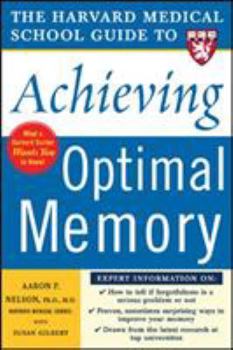The Harvard Medical School Guide to Achieving Optimal Memory
Select Format
Select Condition 
Book Overview
From a leading expert at one of the world's most respected medical schools--a complete program for achieving optimal memory, for life
Ever find yourself walking into a room and forgetting why? Having trouble remembering that pesky password or your siblings' birthdays? Don't panic. Memory lapses like these are common, especially after age forty. But memory loss isn't inevitable or irreversible. You can achieve optimal memory at any age--and this book shows you how.
Dr. Aaron P. Nelson, a member of the Harvard Medical School faculty and a clinical neuropsychologist, has helped thousands of patients with memory and other cognitive problems. In his easy-to-understand guide you'll find:
How to know if you've got a problem and how to have it evaluated How factors such as smoking, poor nutrition, and a sedentary lifestyle can hurt your memory A complete memory-optimizing program, including mental exercises, nutrition, tips for remembering important things, and moreCurrent and future treatment options for serious memory impairmentAbout the Harvard Medical School health guide series
Each book from Harvard Medical School gives you the knowledge you need to understand and take control of your health. In every book, a world-renowned expert from Harvard Medical School provides you with the latest information on diagnosis, traditional and alternative treatments, home remedies, and lifestyle changes that can make a powerful difference in your health.





